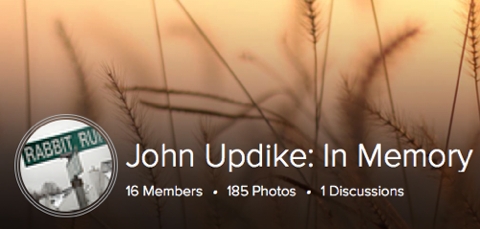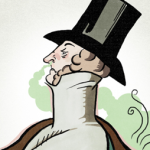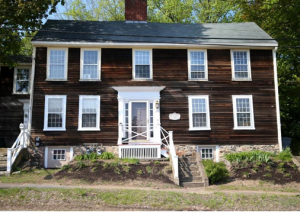We received the following note and accompanying materials from Michael Updike, who notes that the bags that Paul Moran famously hauled away from his father’s Beverly Farms curbside contained much more than trash, and offers an important donation if Moran will donate his part to The John Updike Childhood House:
Dear John Updike Society,
As you know my father, as a young aspiring cartoonist, sent off fan letters asking established cartoonist for original artwork. I have enclosed a letter to Harold Gray of The Blondie strip that has miraculously survived.
The most famous successes to these letters were original works by Saul Stienberg and James Thurber. These were in the exhibit of JHU items at the Boston conference and mentioned in Due Consideration P.612 . Another bit of booty was this original Mickey Finn strip by Lank Leonard. It is signed in cartoon capitals “-TO JOHN UPDIKE-WITH ALL THE BEST FROM Lank Leonard”. It has been kicking around our house ever since I remember. At some point (circa mid seventies) the last three panels went missing. The tape had long given way. I assumed they were lost for good to the far corners of the house or thrown out. Recently, to my great surprise, the lost panels showed up on The Other John Updike Archive. I can only assume that my father took them during the divorce and they went to the trash shortly before or after his demise. My siblings and I would love to see the two parts of this comic reunited after forty years of separation. We would happily donate our half of the work to the John Updike House if the other owner would donate as well.
Thanks very Much
Michael
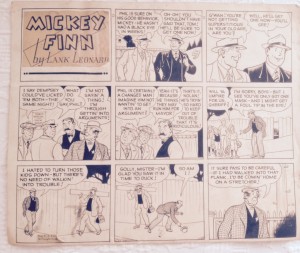
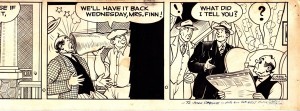
January 2, 1948
Mr. Harold Gray
c/o New York News Syndicate
220 East 42nd Street
New York 17, New York
Dear Mr. Gray:
I don’t suppose that I am being original when I admit that ORPHAN ANNIE is, and has been for a long time, my favorite comic strip. There are many millions like me. The appeal of your comic strip is an American phenomenon that has affected the public for many years, and will, I hope, continue to do so for many more.
I admire the magnificent plotting of Annie’s adventures. They are just as adventure strips should be–fast moving, slightly macabre (witness Mr. Am), occasionally humorous, and above all, they show a great deal of the viciousness of human nature. I am very fond of the gossip-in-the-street scenes you frequently use. Contrary to comic-strip tradition, the people are not pleasantly benign, but gossiping, sadistic, and stupid, which is just as it really is.
Your villains are completely black and Annie and crew are practically perfect, which is as it should be. To me there is nothing more annoying in a strip than to be in the dark as to who is the hero and who the villain. I like the methods in which you polish off your evil-doers. One of my happiest moments was spent in gloating over some hideous child (I forget his name) who had been annoying Annie toppled into the wet cement of a dam being constructed. I hate your villains to the point where I could rip them from the paper. No other strip arouses me so. For instance, I thought Mumbles was cute.
Your draughtsmanship is beyond reproach. The drawing is simple and clear, but extremely effective. You could tell just by looking at the faces who is the trouble maker and who isn’t, without any dialogue. The facial features, the big, blunt fingered hands, the way you handle light and shadows are all excellently done. Even the talk balloons are good, the lettering small and clean, the margins wide, and the connection between the speaker and his remark wiggles a little, all of which, to my eye, is as artistic as you can get.
All this well-deserved praise is leading up to something, of course, and the catch is a rather big favor I want you to do for me. I need a picture to alleviate the blankness of one of my bedroom walls, and there is nothing that I would like better than a little momento of the comic strip I have followed closely for over a decade. So–could you possibly send me a little autographed sketch of Annie that you have done yourself? I realize that you probably have some printed cards you send to people like me, but could you maybe do just a quick sketch by yourself? Nothing funny, just what you have done yourself. I you cannot do this (and I really wouldn’t blame you) will you send me anything you like, perhaps an original comic strip? Whatever I get will be appreciated, framed, and hung.
Sincerely,
(Signed, ‘John Updike’)
John Updike
Elverson P. D. #2
Moran did the Updike world a huge favor when he saved all those bags from the dumpster, and the Society would have loved to bid on them. They would have made for terrific exhibits for The John Updike Childhood Home at 117 Philadelphia Avenue in Shillington, Pa., where Updike said his “artistic eggs were hatched.” Hopefully they’ll end up in a public, not private, collection.
The John Updike Society is committed to building a world-class author home museum, and anyone with materials to donate or offer for sale should contact Society president James Plath, jplath@iwu.edu. We are a 501c3 non-profit organization so all donations are tax deductible, and all donors will be acknowledged at the point of exhibit. We are also planning a donor wall where all who donate $500 or more, cash or in-kind, will be honored.

